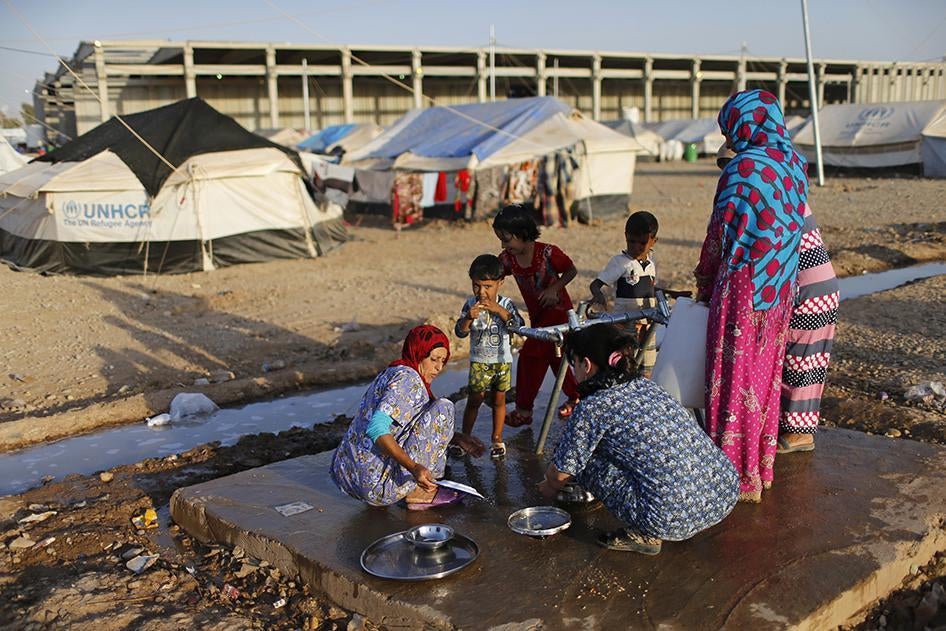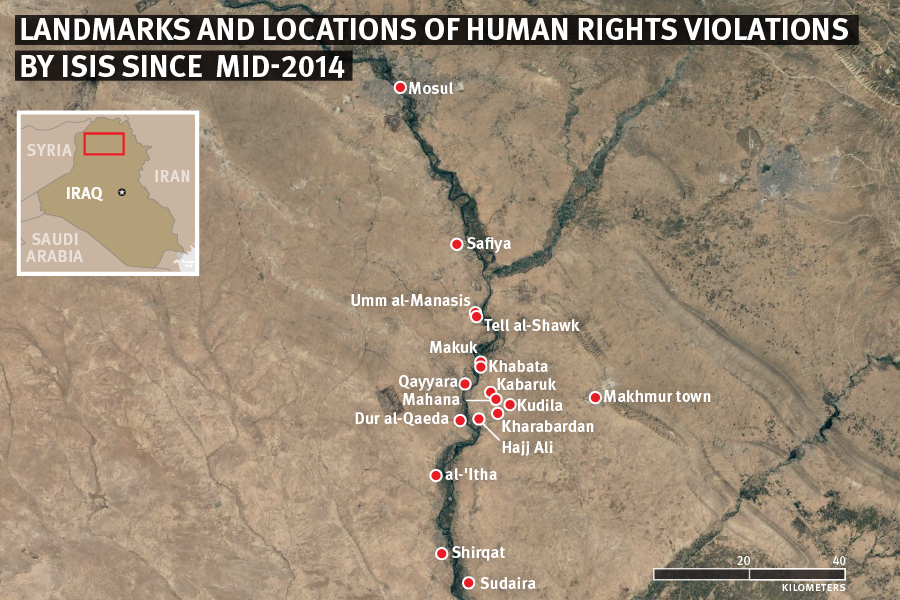(Beirut) – The Islamic State ruled Iraq’s Makhmur district for 21 months with summary executions, torture, and collective punishment of villagers. The extremist armed group, also known as ISIS, prevented civilians from fleeing and placed them at unnecessary risk of attack.
“Out of the headlines, ISIS routinely destroys lives and families in the Iraqi towns and villages it occupies,” said Joe Stork, deputy Middle East director. “Simply trying to escape ISIS’s cruel rule can be a death sentence.”
In May 2016, Human Rights Watch interviewed 20 residents from villages in Makhmur district, in northwest Iraq, who had fled to a displaced persons camp in the Kurdistan Region of Iraq (KRI). ISIS forces captured Qayyara, Khabata, and Makuk, among other towns and villages in mid-2014.
The villagers told Human Rights Watch that before Iraqi government forces retook the area in March, 2016, ISIS executed or “disappeared” government security personnel, civilians attempting to flee, and suspected government informants.
Villagers described ISIS mistreatment of those suspected of violating the group’s strict version of Islam. One man said ISIS fighters beat him in custody every day for 18 days to force him to confess to selling cigarettes, which ISIS bans. He said he also witnessed 15 female ISIS guards biting a woman in public as punishment for not covering her face.
The villagers also said that ISIS put them at grave risk of attack by firing artillery next to homes without moving civilians away, subjecting them to return fire. Villagers said that ISIS deployed weapons and fighters in or near schools, leading in one instance to an airstrike that damaged the building.
ISIS frequently enforced its rules through collective punishment, which is prohibited by international law, Human Rights Watch said. Villagers said that ISIS blew up at least six homes of families as punishment after their relatives fled. ISIS also mined areas to deter people from fleeing. When a police officer died in May 2015 after stepping on an IED while trying to flee, ISIS sent the man’s family a photo of his remains and ordered them to leave.
“Executions, collective punishment, and a disregard for civilian life are part and parcel of ISIS rule,” Stork said.
Summary Executions
Villagers reported a number of cases in which people trying to flee ISIS-controlled villages were captured and executed. In May 2015, ISIS captured Muhammad Husain Ghadhban, a 20-year-old security officer who was trying to escape from Khabata. ISIS shot him and sent his family a photo of his body, two villagers said.
ISIS captured Abd al-Aziz Muhammad Gharib, 20, a police officer who had also attempted to escape from Khabata, and executed him in Makuk on July 17, 2015. In Makuk’s main square, Gharib was made to kneel blindfolded with his hands tied behind his back and an ISIS fighter shot him in the head, denouncing him as a traitor, a villager said. ISIS did not return the body to the family and did not allow them to hold mourning ceremonies, villagers from Khabata said.
In August 2015, ISIS fighters gathered the men from the village of al-‘Itha, near Shirqat, and accused four men between the ages of 19 and 31 of transmitting information by mobile phone to the Popular Mobilization Forces, the official body set up to bring mainly Shia militias under government control. ISIS fighters lined up the four men and executed them, three with shots to the head and one by beheading, said a villager who was there.
In January 2016, ISIS summarily executed Saif al-Din Ahmad Muhammad, 32, a shepherd who was tending his sheep in Makuk. A teacher from Khabata, the shepherd’s home town, said that ISIS alleged that Muhammad had passed information to opposition forces. The shepherd’s family received a photo of Muhammad’s body from ISIS. ISIS then returned Muhammad’s body, allowing the family to bury him but barring mourning ceremonies, the teacher said.
In February, ISIS apprehended Husam Jasim, 20, from the village of Tell al-Shawk, and another young man from the village of Safiya, to its north, a young villager said. The ISIS fighters read an execution order that accused Jasim by name of using his mobile phone to send information to opposition forces. An ISIS fighter then shot Jasim in the head in front of Tell al-Shawk’s primary school. The witness said they put Jasim’s body in a car with the man from Safiya. Residents of Safiya said ISIS executed the second man later that day in Safiya, also for using his mobile phone.
ISIS executed three women after catching them trying to escape on April 22, two relatives said. The women’s husbands had fled after ISIS occupied their area in about June 2014. The women paid a smuggler 100,000 Iraqi dinars (US$83) each, but ISIS found them in a hut outside the village. The 10-year-old daughter of one of the women called her father from the hut when she saw ISIS fighters approaching, the father later told one of the relatives.
A relative said that children of one of the women told him they saw ISIS fighters hit the women with sticks and rifle butts. The fighters then called the women’s fathers and told them to come fetch the children. The fighters then took the women to the village of Hajj Ali and called their husbands that night, demanding a ransom of US$2,000 each. The husbands did not pay because they believed their wives were no longer alive. The next day ISIS brought the bodies of the three women to Makuk and returned them to the families. A relative of one of the women said that her body was covered in burns and knife cuts and bore the marks of several gunshot wounds.
“Disappearances”
ISIS forces have abducted and are feared to have executed several people without providing information to their families about their fate, effectively committing “disappearances.”
On July 3, 2014, ISIS allegedly took a military intelligence officer from his home in Dur al-Qaeda, near Qayyara bridge. The officer has not been seen or heard from since. A relative said he asked many times about the officer but that ISIS did not respond. He said ISIS fighters forced the officer’s wife and mother to leave their home and seized their car.
On October 8, 2014, ISIS fighters in Kharabardan demanded that 10 military officers “repent” for their work for the state, pay US$2,000 each, and surrender their weapons, a relative of one of the men said. ISIS arrested the officer two days later, before he could pay, and he has not been seen or heard from since, the relative said.
Other Punishment
ISIS punished people in Makhmur district for acts it had forbidden, including smoking and selling cigarettes. ISIS detained one resident of Khabata three times for selling cigarettes, another resident said. The first two times he avoided punishment, but the third time ISIS fined him 250,000 dinars (US$211).
In March 2015, shortly after ISIS took control of Kharabardan, three ISIS fighters went to the home of a military officer at about 6 p.m., blindfolded him and tied his hands behind his back, and loaded him into a Toyota pickup truck. “I was lucky that they didn’t know I was in the military,” he said. They drove for about one hour without telling him why or where they were taking him:
They held me at Qayyara jail for 18 days, in a series of army officer’s homes that they were using as jails but they had installed proper prison doors in the rooms to make them into cells. There were many prisoners there, most of us charged with selling cigarettes and shisha [water pipe], or for owing money.
The officer said one room where he was held was so packed that no one had room to lie down to sleep. Prisoners would knock on the door to ask a guard to take them to the toilet – they might have to wait for hours for a response because ISIS guards frequently fled the building, fearing attack from opposition planes flying overhead.
The guards used one room for torture, he said. Every day guards took him into the room and put him on a couch. One man would sit on his chest, another on his legs, and a third would beat the bottoms of his feet with metal cables for at least 30 minutes. He said they wanted him to confess that he sold cigarettes and give up the name of his supplier. He finally paid a fine of 15,000 dinars (US$13) to al-Hisba, the ISIS morality police, and guards released him.
The day he was released, he said he was walking through the main square in Qayyara and saw a crowd of at least 15 female guards and a woman in the middle. The guards started biting her arms and her neck. One onlooker told him the woman was being punished because she had not covered her face. “I just stayed for 10 minutes but then left, it made me feel sick,” he said. “So I don’t know what happened afterward.”
A husband and wife from Mahana said that they had seen at least five lashings of people for smoking or for dress infractions when ISIS controlled the village, from June 2014 until May 2016.
ISIS blew up the homes of two security officers who fled Kabaruk when they heard ISIS was coming, said a relative of both men. They also blew up the relative’s home because his family refused to hand over his father, a military officer.
ISIS blew up the homes of at least two families in Kudila as punishment after they fled the territory in April 2016, villagers said. They had blown up a few homes in Kharabardan for the same reason, a resident said.
Endangering Civilians
The laws of war apply to areas under ISIS control. They require all parties to the conflict to take all feasible precautions to protect civilians under their control from the effects of attacks, and to avoid placing military forces in densely populated areas.
Several civilians said that ISIS unnecessarily endangered civilians during fighting in Makhmur by deploying their forces among the civilian population. ISIS fighters carried out rocket attacks from between shops on the main road running into the village of Kharbata, one resident said:
Three times ISIS launched rockets from in between houses. They would pull up their launchers, fire two rockets or mortars, and then withdraw. The return fire then hit the house. If the family had been there, they would have been hit. Other families were close by, in their houses. The last time was in March 2016.
Fighting to retake Mahana began in February 2016. ISIS stationed weapons between houses without warning residents, then fired and retreated, residents said. The return fire damaged many houses.
A military officer from Kudila and his wife said they did not let their children go to school in Kharabardan because ISIS had set up headquarters in the building opposite the school, so they worried about airstrikes on the school.
ISIS took over the school in Mahana, using it to store weapons, residents said. They positioned explosive-rigged cars at either end of the school. In February 2016, an airstrike hit one of the cars, which exploded, damaging the school.
Human Rights Watch has withheld the names of those interviewed at their request, to protect their identity.









